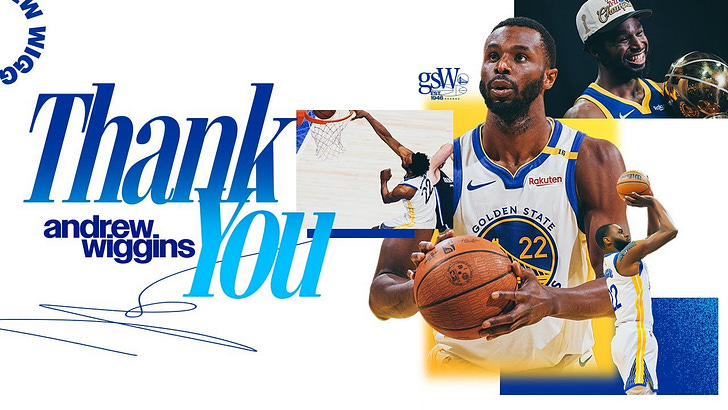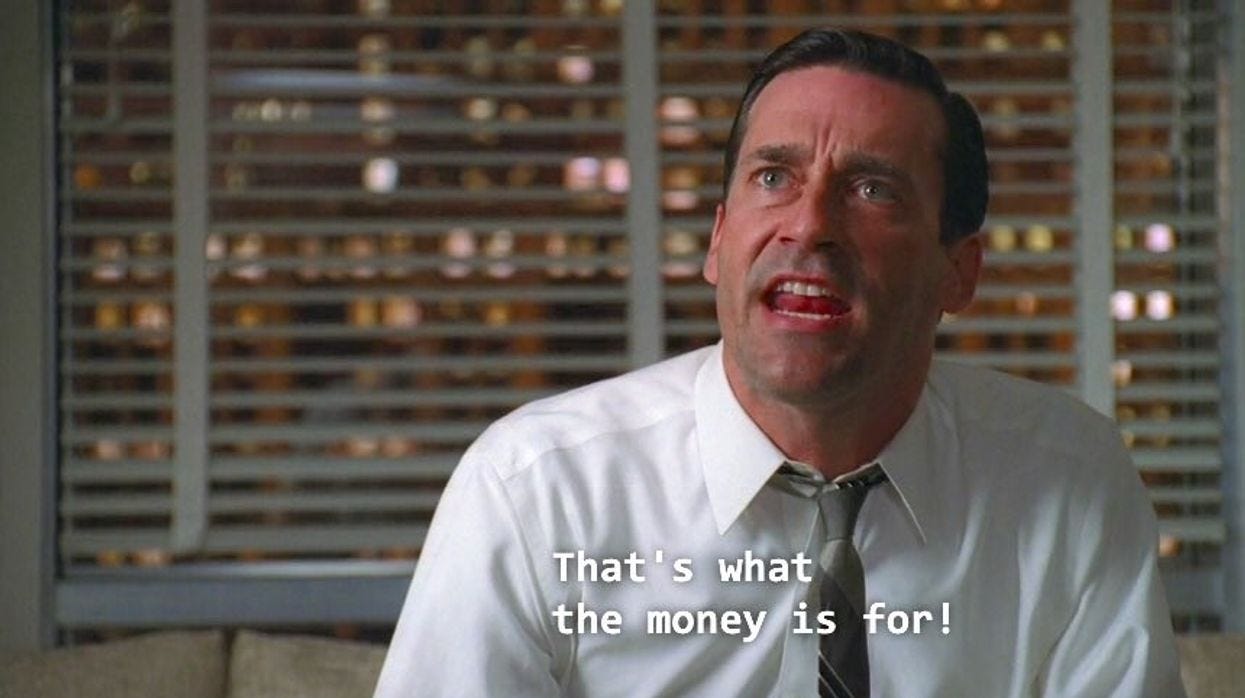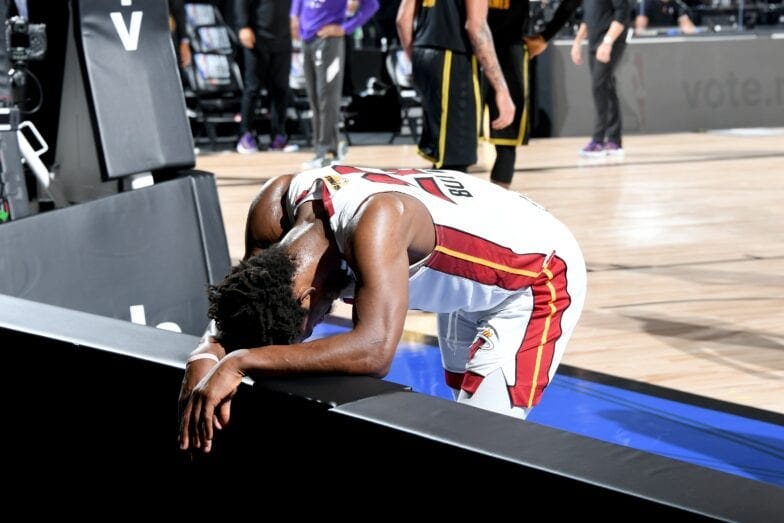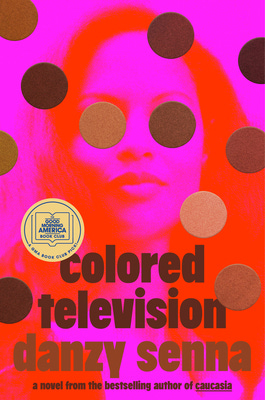Warriors Record: 25-26
Wizards Record: 9-41
I remember the blissful times before I knew anything about the trade deadline. When early February was just early February, filled with the birthdays of many people I love and not the nail biting, twitter watching poorly sleeping time of the trade deadline for the NBA.
This is the ugliest part of the year. The players couch it in the usual cliches - “it’s a business” but every once in a while someone comes out with a more accurate truth. This season it’s the Warriors’ (no, the Jazz, no the Pistons) own Dennis Schröder calling it “modern day slavery”.
Schröder has already taken all kinds of heat for this statement and yes, it’s not slavery - there is currently modern day slavery and it’s not the NBA. But the trade deadline is a word that maybe doesn’t exist yet but means - “it’s not fair and is morally wrong and is tied to racism and you would hate being treated this way at your job.” In the larger context of Schröder’s quote he said that there should be a better way to do it so that while younger players might still move around, at some point more veteran players should have more control.
Can you imagine being one of the 10 best people in the world at what you do and yet not having control over whether you stay where you are or leave? That’s Luka Dončić - he and everyone else thought that he was a franchise cornerstone at the Dallas Mavericks - the piece around which the rest of the team was built. A 25 year old phenom - All NBA, took his team to the NBA finals while he was injured. Had just bought a house in Dallas. Traded to the Lakers for Anthony Davis and much more importantly, traded without his knowledge until the moment it happened. Players rarely get taken by total surprise like that - they know they are in trade discussions and they realize either because of their performance (good or bad) or their salary size - they are likely to be in trade talks. When Luka got traded, it sent ripples throughout the league - anyone could go and no one is safe. There haven’t been this many big names traded midseason in a while, maybe ever.

When players get traded mid-season, it’s always awkward. They are often on the road, playing with one team and suddenly on a plane to another team in a different city with the luggage they had with them, staying in a hotel.
For years, anytime Chris Paul moved teams, he moved up to 10 people with him - his wife and kids, his brother who is his manager and probably a few other people - agent? Trainer? Who knows. He said that was essential to his well-being to have his family with him. But more recently, his kids are older, they can’t keep moving every few years. He said he chose to make it be hard for him instead of hard for his kids. His family stayed in Los Angeles. When he played for the Warriors, it was an easy plane ride, but NBA players in season don’t have disposable time and Paul would talk about the trade-offs of the tremendous expense of a private jet vs flying commercial when he only had 24 hours off and was trying to get to a kid’s ballgame, dance practice or school conference. This year Paul is in San Antonio and the commute is not as simple. He said the first thing Coach Popovich told him was that if he needed to leave to see his family, to let them know. It is a rare coach who will make that offer.
In his memoir, DeMar DeRozan talked about the toll of being away from your kids and the cost of getting traded. He was clear that his mental health was much worse when his kids didn’t live with him after a trade, that it was too easy to get in your head and living in hotels or a version of corporate housing was not good for him. Having a lot of money and a fair amount of dead time in hotels in cities and being by yourself is a recipe for disaster on every level.
The Warriors have tended to keep players for a long time, which is not usual. Let’s look at the more typical career of Dennis Schröder, a man who is on his third team this year.
In the league for 12 years, spent his first 5 years in Atlanta and since then traded 9 times. At no time did he get traded because a team was trying to get off a big salary or because of horrid performance - he is a player who teams have been trading for (with the exception of yesterday’s trade to Detroit). And yet, the more valuable he gets, the more he gets traded.
When he was abruptly traded from Brooklyn to SF in December - his wife and 3 kids (ages 6, 4 and 2) stayed in Brooklyn through the holidays. When asked, Schröder repeatedly said that he would play better once his family was here. And guess what - he did. Wednesday night, he was traded from the Warriors to Miami, then Utah then this morning to Detroit. His family moved to San Francisco last week.
I know there are people saying, like Don Draper:
NBA players make tons of money. But since the owners are investing so much money in these players, wouldn’t they want to do everything to maximize their performance? They wear trackers in practice to record every little thing to try to get any edge they can. Why wouldn’t they want to do the simpler things - having your family here - to improve performance?
What’s the answer? Coach Kerr suggested that the trade deadline should be moved to align with the All Star Break so that when players get traded, it’s while they are already on time off and they have time to relocate, move their family, adjust to the situation. I would go further and restrict who can be traded midseason without their consent - maybe it’s number of years in the league, as Shroeder suggests or up to a certain salary amount. I don’t have detailed answers, but it sets up cruel situations for players and teams that are also bad for business. Because of the timing of the trade, the Warriors only had 10 available players last night and tonight, setting themselves up for losses because of airplane schedules.
Which brings me to the Warriors and the Jimmy Butler/Andrew Wiggins trade.
The past few years I’ve dreaded the trade deadline and the Front Office hasn’t really done anything. The anticipatory grief never had to become actual grief. (I might always be working through the Jordan Poole and Klay Thompson trades but at least those happened at the end of the season). But it’s kinda like living in San Francisco with the threat of earthquakes. One of these days it’ll happen.
At this year’s deadline, if there was something the Warriors could do they had to do it - they have Steph Curry on their team and their team is headed to not making the playoffs for a second year in a row. That is unconscionable.
After the Luka trade, the Warriors Front Office appears to have made calls for every current All Star and most notably, Kevin Durant. In that process, every single Warrior became tradeable except Steph Curry - Kuminga and Green who had been considered untouchable, were in the mix. Once Durant said thank you good sir but there is no way in hell I want to go to the Warriors, Butler became the target. The trade, which gives the Warriors Jimmy Butler for the next 2.5 years for $121 million means that Kyle Anderson, Dennis Schröder, Lindy Waters III and most importantly Andrew Wiggins are gone.
Losing Andrew Wiggins is a particularly big loss for the Warriors and a particularly hard thing to do to Andrew Wiggins, done in a particularly painful way. Wiggins found out while he was doing his pre-game warmup on the court. Wiggins’ partner gave birth last week.
It’s undeniable that Andrew Wiggins fit Golden State better than any team he’s been on or probably any other team in the NBA. He didn’t have to be the face of the franchise. He likes to be private, he loves his family - Golden State gave space for both. And in return, he has given Golden State memorable moments and was a huge part of the ‘22 championship. More importantly, as Steve Kerr said, Wiggs was not just low drama but no drama. Wednesday night I listened to local journalists as they did their best to hold Wiggins’ privacy but also express the emotion behind what was happening, emphasizing that you never heard a bad word about Andrew Wiggins from anyone in the organization. Andrew was a kind and generous soul. Andrew shared his family with us - true enough, his young girls, decked out in custom made #22 clothing, were often at games and he was often carrying them one in each arm in the tunnel after games. Reporters revealed that his multiple absences from the team were not just because his father was dying but because his father had had multiple near death experiences. They said that Wiggins repeatedly told others that he loved Golden State, considered it his home and wanted to stay here. (Players don’t often say please don’t trade me, I love it here). The love for Andrew Wiggins came pouring out. The basic theme was - you, casual fan, have no idea how much the team loved him and how seismic this trade is.
I’m tempted to write how much I’ll miss Wiggins and what I loved about him - but he only left a team - he’s still playing basketball. I have League Pass, I already like watching the Heat, so all the things I love about him, I can still see. But let me speak a little about my favorite part of Andrew Wiggins’ game, the part that brings me the most joy. It’s the way he runs. Not when he has the ball, or even when he’s in a play. The way he runs up court after a made basket. He has a very specific bounce on the court, the lower half of his body suddenly looser, swinging from left to right, analogous to Kevin Durant’s shoulder shimmy on free throws, but with his legs. It reminds me of Tigger, or when a little kid is running to the playground. There is something distinctive and pure and buoyant and childlike about his run. There isn’t another player in the league who runs like he does. It’s not on any highlight reel - who keeps video of a player without the ball at midcourt? But the next time you watch him, in Miami, check it out.
In the meantime, here’s my fav off court moment - the hedgehog cafe, during a preseason trip in Japan, the summer after they won the finals.
Let me go back again to the place I started – the idea of owners. If you are the best of the best of the best, shouldn’t you have some control over when you go? Or where you go? Or whether you stay? Only two players in the league have a no trade clause - LeBron and Bradley Beal.
A different article for a different day is about who the owners actually are. If we’ve learned anything lately, it’s that billionaires are not by definition good at everything and they make a lot of decisions based on personal grudges and petty slights. Owners have many reasons to want to own a team - sometimes it’s vanity, or having something that few people can have, or a chance at fame/celebrity that they don’t have beyond their own field. Or for other reasons - there are rumors that Miriam Adelson, majority owner of the Dallas Mavericks, doesn’t particularly care about the Dallas Mavericks’ success or failure but she cares a great deal about expanding her casino empire to Texas and more specifically to the land around the arena. And yes, there are owners who love basketball. To be clear, owners have varying roles in trades - some take no role, some are consulted, some are driving them. But it’s a strange assumption to make that people who are good at acquiring wealth would also be good at helping create the winning roster of a basketball team. And too often the players are seen as tools for creating wealth instead of human beings who require humanity to play their best.
I am upset about Andrew Wiggins and it is also true that I really like Jimmy Butler as a player. I started watching the Heat when Andre Iguodala was traded there, realizing that Duncan Robinson (Michigan alum) was also there. I ran smack into the legend of Jimmy Buckets. His inspirational back story (the short story: he has always been discounted and proved everyone wrong at every level starting in high school). His gritty play, particularly in the postseason, where he dragged his team to the finish line.
His bubble season pop up coffee shop turning into Big Face coffee, his love of Carlos Alcaraz, the way he mentors younger players (first Tyler Herro, then Jaime Jacquez Jr and Nikola Jović), his love of country music and Fall Out Boy. His willingness to sing:
He doesn’t fit the Warriors culture as the culture is a bunch of mellow professional guys - Steph, Wiggs, (Klay), Moody, Looney - they are wise, they are loose, they work super hard - but they are not firing up the locker room. But organizations make the mistake all the time of choosing people for culture fits when what you should be looking for is a culture add. Butler is a culture add.
Jimmy Butler is unforgiving on the court. Or as Marcus Thompson II of The Athletic said in a podcast last night: “If [teams] guard Steph like they guard Steph and treat everyone else like a 24 Hour Fitness squad, Jimmy will torture you. Jimmy will say ‘how dare you guard me like this - I will embarrass your family’”. And they need a guy like that.
Butler said he wanted to leave Miami because he had lost his joy - the Golden State Warriors is a good place to find it - plenty of players have. Andrew Wiggins was one of them as he entirely rehabbed his game and reputation from overrated to legendary. Steph Curry would be known as the most joyful player, if Gary Payton II wasn’t also here. Joy is one of the core values of the Warriors. It remains to be seen if Butler can find it here also.
I don’t think it’s going to be a wild ride. I don’t think there are going to be locker room problems. It might lead to success for the Warriors. And I’m gonna miss Andrew Wiggins for as long as he’s not here.
In the meantime, the Wizards have won three games IN A ROW. IN A ROW! They have also made a ton of trades in the last week, all of which are kinda great for them.
The Timeout Books: (books I read during the timeouts, halftimes and commercials):
A Game At A Time Spotify Playlist (the songs that run through my head while writing this)






